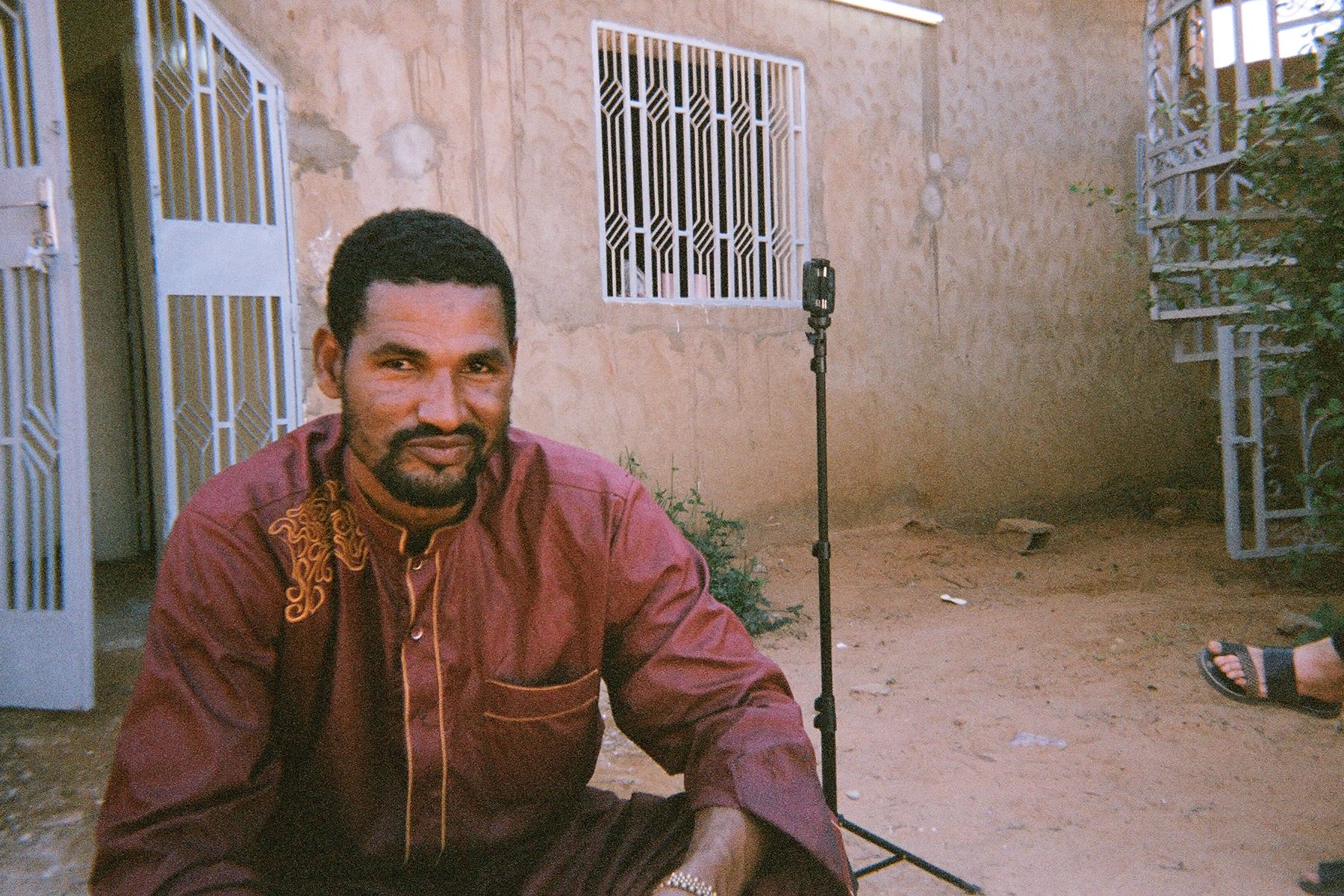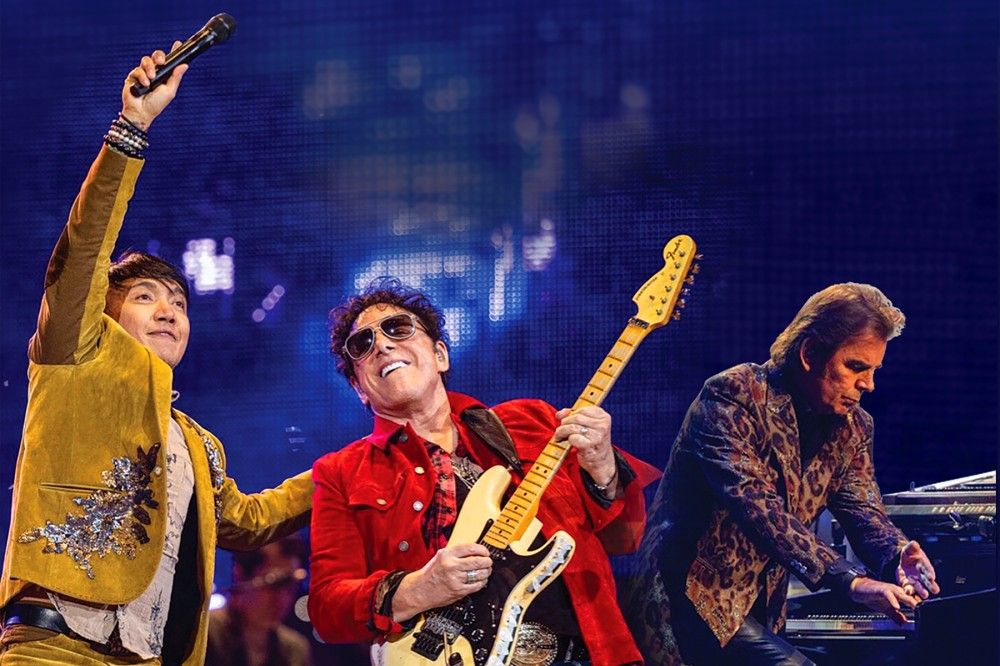
Mdou Moctar’s Songs of Revolution and Love
Mdou Moctar was halfway around the world, in the middle of a lengthy tour in 2019, when his partner gave birth. The Tuareg guitarist, who hails from the Saharan desert City of Agadez in central Niger and is the latest in a growling line of tishoumaren (loosely translated to “desert blues”) musicians to find a receptive audience abroad, was already missing his hometown — “the vibrations of my environment,” as he put it in a recent interview with Rolling Stone (with the help of a translator). And now his partner, Layla, “was calling out for me, but I couldn’t be there.”
Moctar offered up a cry of his own: On “Layla,” a highlight from his new album, Afrique Victime, he smacks and skips over the strings of his acoustic guitar; imagine a linebacker moonlighting for the Royal Ballet. Hand claps and drum kicks pulsing beneath him, an electric guitar periodically ripping through clouds of feedback, he returns Layla’s call with lyrics that translate to, “Layla, Layla/That we love, that I love even more/That we love, that I love even more, Layla.”
Afrique Victime follows Moctar’s 2019 album, Ilana: The Creator, a breakthrough of sorts in terms of his rising profile in the West, but far from a debut. That came more than 10 years prior, with his 2008 album, Anar, a unique blend of Tuareg music with drum machines and Auto-Tuned vocals. Moctar’s songs spread, as much music does in the Sahel region of Africa, via Bluetooth and cellphone-memory cards. This is how Christopher Kirkley, founder of the Portland, Oregon-based blog and label Sahel Sounds, first heard Moctar’s music while traveling in West Africa; Kirkley was so taken, he spent several years trying to track down the artist, identified only as “Mdou” on the digital file he’d received.
Moctar and Kirkley finally met in 2011, kicking off a wildly creative run. Between 2013 and 2019, Sahel Sounds released three Moctar albums, Afelan, Sousoume Tamachek, and Ilana. And in 2015 Moctar starred in and provided music for a film Kirkley directed, Akounak Tedalat Taha Tazoughai, an homage to Prince’s Purple Rain that was also based on Moctar’s life, including his desire to become a musician despite the concerns of his religious parents (the title translates to “Rain the Color of Blue With a Little Red In It,” as there’s no word for “purple” in the Tuareg language, Tamashek). Last year, Moctar signed to the indie label, Matador Records, which is releasing Afrique Victime on May 21st.
Matador co-owner Gerard Cosloy said that he’d been following Moctar ever since hearing one of his songs, “Tahoultine,” on the Sahel Sounds compilation Music From Saharan Cell Phones (Vol. 1). While Cosloy said he would’ve been content to remain a fan, “in early 2019 a mutual musician friend did the nudge-nudge thing, suggesting Mdou would be interested in recording for Matador.” After a few meetings — which Cosloy admitted were “mostly excuses to see [Moctar] play as many times as possible” — a deal was signed. “As much as we love Mdou’s prior works, Afrique Victime feels like his most fully realized musical and lyrical statement to date, and the one album (so far) that brings so many of the things he does so well to the table on one recording,” Cosloy said. “All of that said, we’re also of the belief he’s not even skimmed the surface of what he and his colleagues are capable of.”
Moctar mostly recorded Afrique Victime on the road in 2019. With the Tuareg people being semi-nomadic, it’s perhaps not surprising that Moctar says he enjoyed recording songs one at a time in various studios, as opposed to holing up in one place for a week like he and his band did for Ilana. In this way, too, Afrique Victime captures the rich chemistry of the Mdou Moctar Band in the midst of a run of shows. The four-piece comprises Ahmoudou Madassane, Moctar’s rhythm guitarist and close collaborator since 2008; the hotshot drummer, and the group’s youngest member, Souleymane Ibrahim; and Brooklyn-based bassist Mikey Coltun, who also serves as their road manager and producer/recording engineer.
Ilana was, in many ways, a this-one-goes-to-11 exhibition of Moctar guitar prowess (see “Ilana” and “Tarhatazed” in particular). And while Afrique Victime does not lack stunning six-string displays, it’s a much airier offering, filled with acoustic guitar and laced with atmospheric field recordings made in Niger. Musician Dave Harrington, an avowed fan and one half of the acclaimed electronic duo Darkside with Nicolas Jaar (now labelmates with Moctar on Matador), praised the album’s “directness and muscle, how it feels spry and heavy all at once,” in an email.
“[Moctar’s playing] has all the hallmarks of the kind of guitar playing that I love and aspire to,” Harrington added. “He’s got one foot in a tradition but he only sounds like himself; there’s a deep melodic sensibility at play and still a true spontaneity in the lines and structures of his soloing; there’s a feeling that I get of a truly psychedelic anything-can-happen improvisational danger in the transmission of the ideas; and maybe most importantly, he locks into gear with the band and just drives … the way the four of them coalesce into a unit is powerful stuff, the stuff of the truest of top-shelf brain-meld jam magic.”
Some of the songs on Afrique Victime, Moctar says, had been kicking around his head for a while, but his creative process is inquisitive and open to change as he responds to the world around him. “I’ve never in my life written down a song,” he says. “It can be an issue sometimes, but usually I’ll just pick up my guitar and try to reproduce the sounds I hear in my heart and my head. It’s kind of trial and error … and then from playing it over and over, I memorize it. Sometimes when I’m playing it later on, I might adapt the rhythm, or I’ll be doing a solo and suddenly I’ll find a great sound that I love, so I keep it. That’s how songs get created, little by little.”
Afrique Victime is an intimate album, and Moctar a keen observer of the human heart, its hopes, aches, and foibles. “Asdikte Akal” is a nostalgic ode to home, written from far away, while “Ya Habibti,” he says, is another song for Layla, steeped in the memory of their first meeting. “Tala Tannam” also seems to be for her, Moctar’s acoustic guitar fluttering as he sings, “I used stones to write your name in a heart/Water can never wash it away because it’s surrounded by trees.” “Taliat” and “Bismillah Atagah” tend kindly to broken hearts and unrequited loves, while opener “Chismiten” is a fiery prayer against jealousy and insecurity, punctuated by one of the album’s most heroic solos.
And then there’s “Afrique Victime,” a salvo against post- and neocolonialism sung partly in Tamashek, but also largely in French, so that it could be understood in the country that still maintains a military presence in Niger and exploits its people and land for mining uranium. The seven-and-a-half minute opus moves with a bluesy chug that quickens almost imperceptibly until all of a sudden the bass is off like a rocket, the drums are careening across the mix like comet chunks, and Moctar’s guitar is a tangled, twisted, blazing beam of light cutting across a black sky. The refrain he repeats throughout is heavy with righteous anger and a sense of desperation, though not bereft of hope: “Africa is a victim of so many crimes/If we stay silent it will be the end of us/Why is this happening? What is the reason behind this?”
“Afrique Victime” may seem like an outlier on the album, but that doesn’t mean it’s in tension with the rest of the LP. As the centerpiece and title track, it speaks to the way the currents of daily life — joy and disappointment, celebration and sorrow — still flow beneath the great waves of history and conflict. “There’s been a tradition of revolutionary music in the Tuareg people, it’s always been a way to encourage our warriors, and a way to educate younger people about what it’s like to fight for your rights,” Moctar says. “And then, of course, it’s been a way to bring pleasure and happiness amongst all Tuareg people, including women and children.”
That revolutionary streak goes back to the pioneering tishoumaren group Tinariwen, whose members were part of rebel groups that fought to ensure equal rights for Tuareg communities, long marginalized in the countries they live in across the Sahel. Moctar, too, fought in the Tuareg uprising of the early 2010s, which he says was spurred in part by the fact that Tuareg people were not treated like full citizens in Niger, deprived of drinking water, electricity, schools, and hospitals. In the decade since, he says, conditions for Tuareg communities in Niger have improved, but the country and all its people remain under the thumb of their not-exactly-former colonial masters. It’s not just the French who have planted themselves in Niger, either. Just outside Moctar’s hometown of Agadez, the U.S. military has built a $110 million drone base, while the CIA decided it needed its own base as well, 350 miles away in the town of Dirkou.
“The presence of these bases is at the root of the things that are currently destroying Niger,” Moctar says. “We didn’t really have terrorism in such a developed way, like Boko Haram, before these military presences came into the country. There’s the French base, and now the U.S. military base, and that coincides with the period during which terrorists started getting out of control beyond what Nigerians can manage on their own. These Western countries said they came to prevent terrorism, yet currently there’s terrorist groups killing people, and these militaries — it’s happening right next door and they’re not reacting! Yet they’re fully equipped and trained, but they’re refusing to intervene. I don’t understand why they’re not supporting our own local forces in the desert if they want to help us so much.”
Moctar has spent the past year trying to do what he can to help those in Agadez and the surrounding region. Forced to cancel a North American tour in 2020 due to the pandemic, he used that time to travel around Niger instead. He says he wanted “to see how people live and find out about the suffering that’s happening in the desert. I quickly realized that people had problems accessing drinking water, so I’ve been helping to build wells in the desert with my money.”
Covid-19 hasn’t hit Niger especially hard (there have been just 5,325 cases and 192 deaths, according to recent data), but it’s disrupted life in the expected ways: People can’t gather at their mosques and frequent community events like weddings have largely been called off. The latter has been particularly devastating for musicians in Agadez, who can make good money playing such events. “I would say that most local musicians have gone bankrupt, sadly, all the ones that weren’t able to save and were taken by surprise,” Moctar says.
Under normal circumstances, music is one of the best ways for a young person to make money in Agadez, with Moctar comparing its role in the area to that of soccer in other cities. This is why the region has produced so many talents, including Moctar’s contemporary, Bombino, as well as his predecessor and mentor, Abdallah Oumbadougou, who died in January 2020. “Abdallah was the very first person I saw playing guitar at a concert, so he’s someone who’s always been incredible to me,” Moctar says. “More than human, if you know what I mean. I have a lot of love for what he did, and it’s really thanks to him that I became an artist.”
At the root of Moctar’s music is an endless curiosity. “That’s in my blood,” he says. “I think curiosity can help music evolve continuously. Creativity also requires working hard. It can come from doing a lot of work and experimenting. He remains deeply inspired by “what nature and my surroundings impose on me.” If Afrique Victime, then, is a document of love and longing, crafted while far away from home and family, Moctar’s next project will likely be a product of what he’s witnessed back home in Niger, especially over the past year.
“What’s inspiring me at the moment is what’s happening here in Africa,” he says. “My music is going to become more inspired by revolution, I really want to compose on that theme. It’s what seems relevant to me at the moment. We’re facing problems related to terrorism, injustice, corruption, and the ongoing exploitation of the country by France. I want future albums to touch on those themes..”’
But he adds: “I’m also not the kind of person who can forget about the theme of love, because that’s what binds and unites people together.”




